Veteran orchid cultivator among four to be recognised for preserving culture, passing down skills
Sign up now: Get ST's newsletters delivered to your inbox
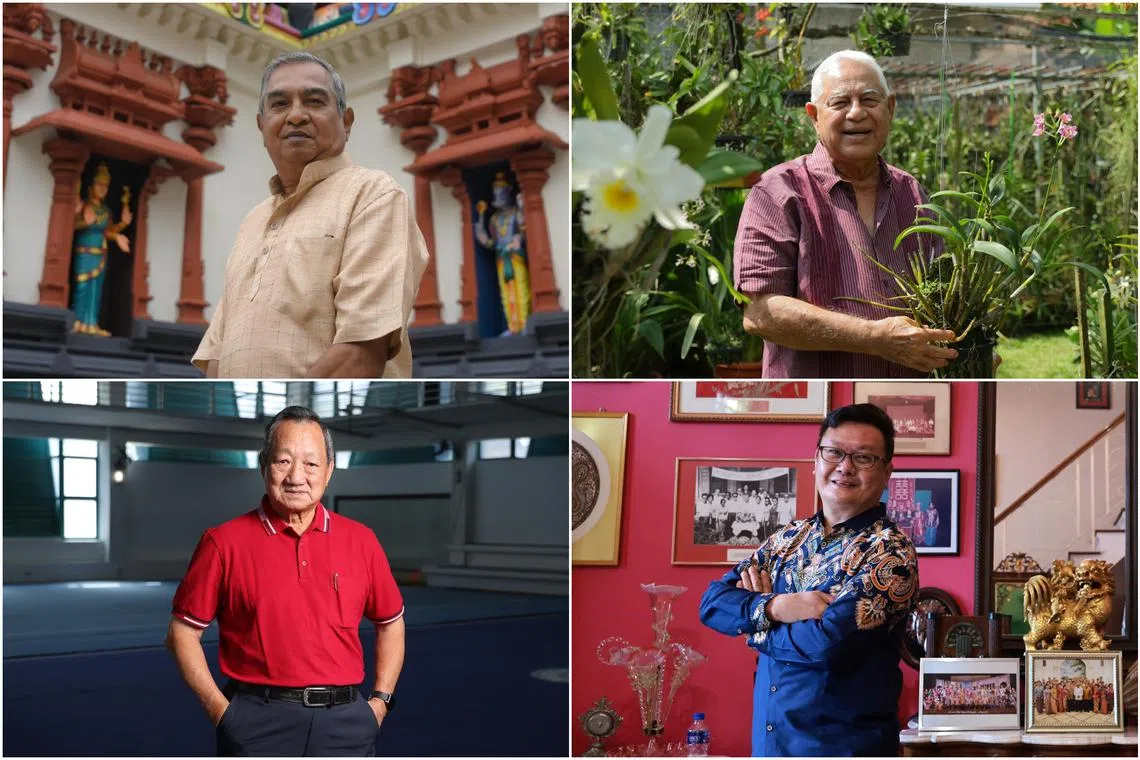
(Clockwise from top left) Mr Balakrishnan Ramasamy, Mr Syed Yusof Alsagoff, the Gunong Sayang Association represented by its president Alvin Teo, and the Singapore Wushu Dragon and Lion Dance Federation represented by its president Ang Mong Seng will be recognised by NHB for promoting and passing on their skills and traditions..
ST PHOTOS: MARK CHEONG, ONG WEE JIN, JASON QUAH
Follow topic:
SINGAPORE - An orchid cultivator who has been involved in the Singapore Botanic Gardens’ orchid programme since the 1960s is among four individuals or groups who will be recognised by the National Heritage Board (NHB) next Tuesday for promoting and passing on their skills and traditions.
They will receive the Stewards of Intangible Cultural Heritage Award, which lauds practitioners who have made outstanding contributions in their field, and passed on their knowledge “by nurturing youth practitioners; reaching out to contemporary audiences and the wider public; and bringing practitioners and communities together”, said the NHB.
This is the third edition of the award, which was launched in October 2019. Each winner will receive a trophy, certificate and a $5,000 cash prize. They can also apply for a grant of up to $20,000 to further fund their work.
Nominees each must have had at least 10 years of experience in their practice and be a respected member of their community, among other criteria.
Here are the four award winners.
Cultivator who registered more than 200 orchid hybrids
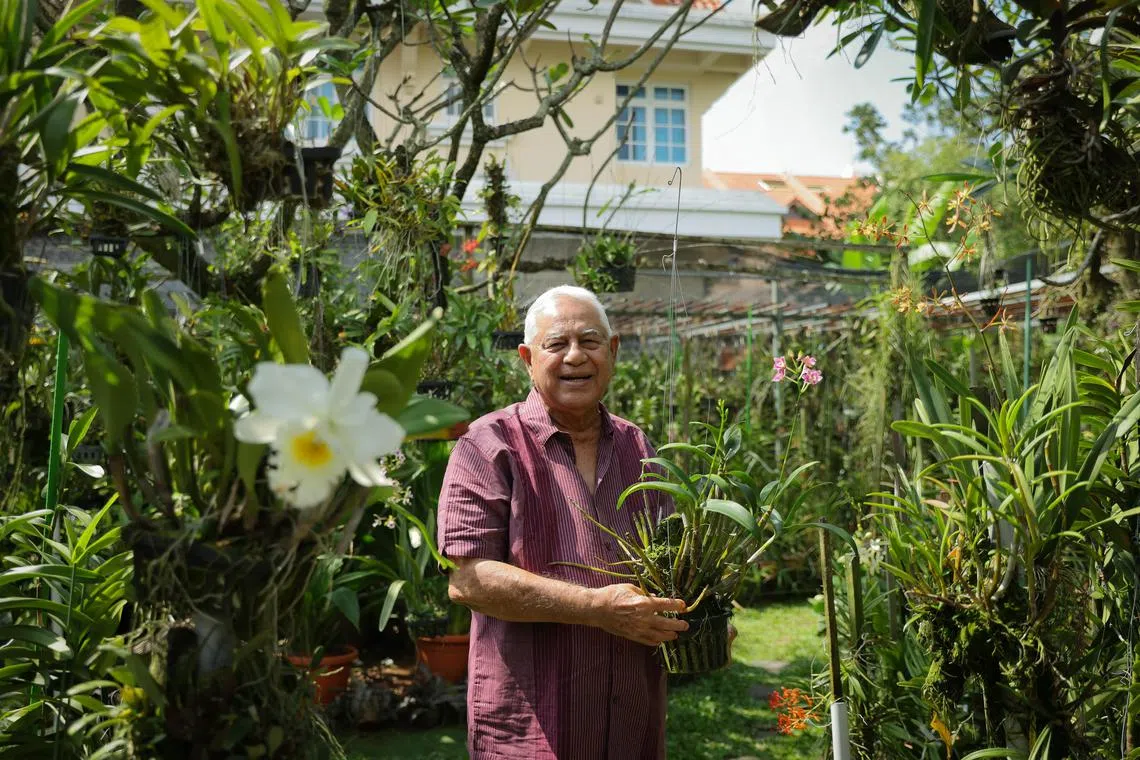
Mr Syed Yusof Alsagoff has over six decades worth of contributions in the field of orchid cultivation in Singapore.
ST PHOTO: ONG WEE JIN
Mr Syed Yusof Alsagoff, 88, has cultivated and registered more than 200 orchid hybrids in a career that spanned over six decades.
“Living near the Botanic Gardens as a child, I used to play there with my siblings,” he recounted.
“Being among the flowers, I got interested and tried my hand at cultivating roses.”
His attempts did not bear much fruit, as roses were difficult to grow in Singapore’s climate. He then turned his attention to orchids.
The self-taught orchid breeder served on the Orchid Society of South East Asia (Ossea) committee from 1964 to 1997, including 14 years as its president.
He helped the National Parks Board and Singapore Botanic Gardens train new staff in orchid breeding, and played a key role in developing the National Orchid Garden.
“What I love about orchids is how you are able to breed new varieties. There are currently over 24,000 known species, and a lot still undiscovered in the world. The possibilities are endless,” he said.
The hybrids that he produced include the Aranda Zahela Alsagoff, which was named after his wife and was the first orchid hybrid to ever receive a first-class certificate from Ossea.
Mr Yusof hopes more Singaporeans will take up orchid cultivation. He continues to volunteer with the Botanic Gardens, teaching staff how to care for the orchids.
“You must have patience when growing orchids. I failed a lot at first, but through trial and error, I learnt the right ways to nurture them over the past 70 years,” he said.
Veteran in karagam tying
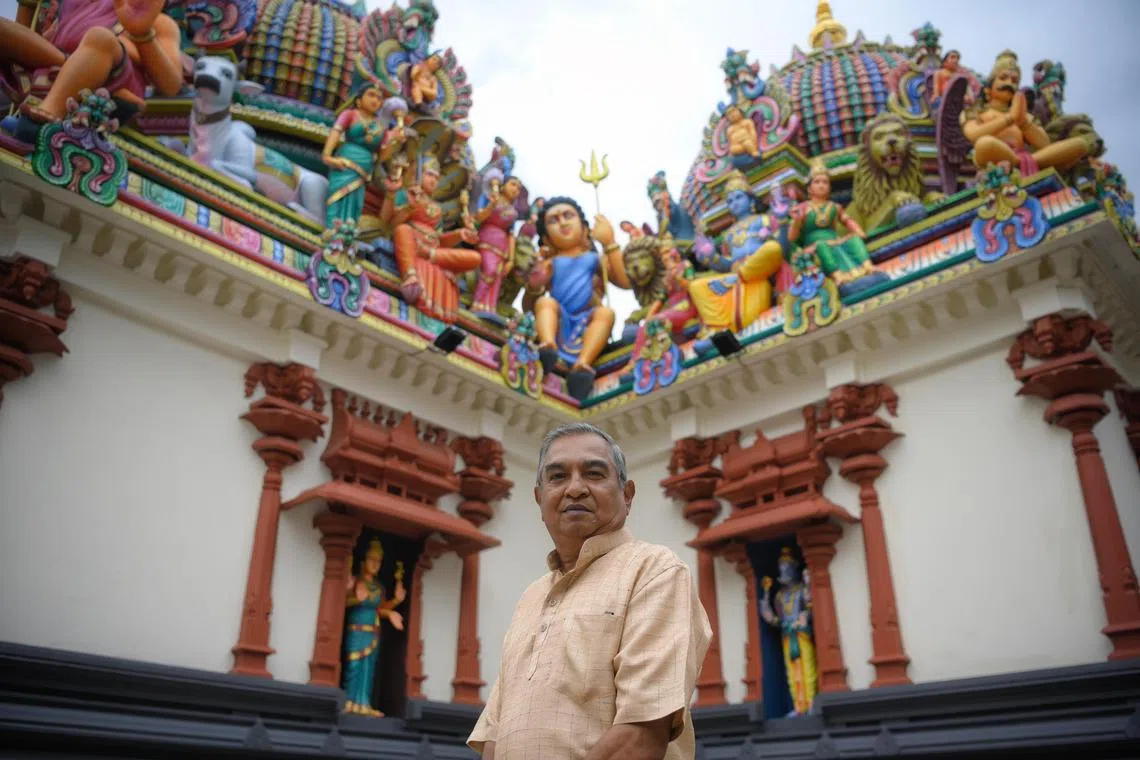
Mr Balakrishnan Ramasamy has more than 30 years of experience in karagam tying, and retired only after passing his knowledge on to a successor.
ST PHOTO: MARK CHEONG
Mr Balakrishnan Ramasamy, 67, learnt how to decorate the karagam – a vessel of water filled with sacred offerings – at 18 when he started volunteering at the Sri Mariamman Temple.
Believed to be a symbol of the Hindu goddess Mariamman, the karagam is tied and decorated with flowers. It is then balanced on the head of a priest in a ritualistic dance known as Karagattam at religious events like the Theemithi (Firewalking Festival).
Mr Balakrishnan, who has more than 30 years of experience in the craft, has taught karagam tying to younger generations of temple volunteers and conducted cultural workshops to raise awareness about the tradition.
The former estate manager at the Indian Heritage Centre said he retired in 2019 only after passing his knowledge on to a successor.
“It is a practice that requires a lot of skill and passion,” he said.
“I hope this award challenges the younger volunteers to give their best.”
Promoting Peranakan culture
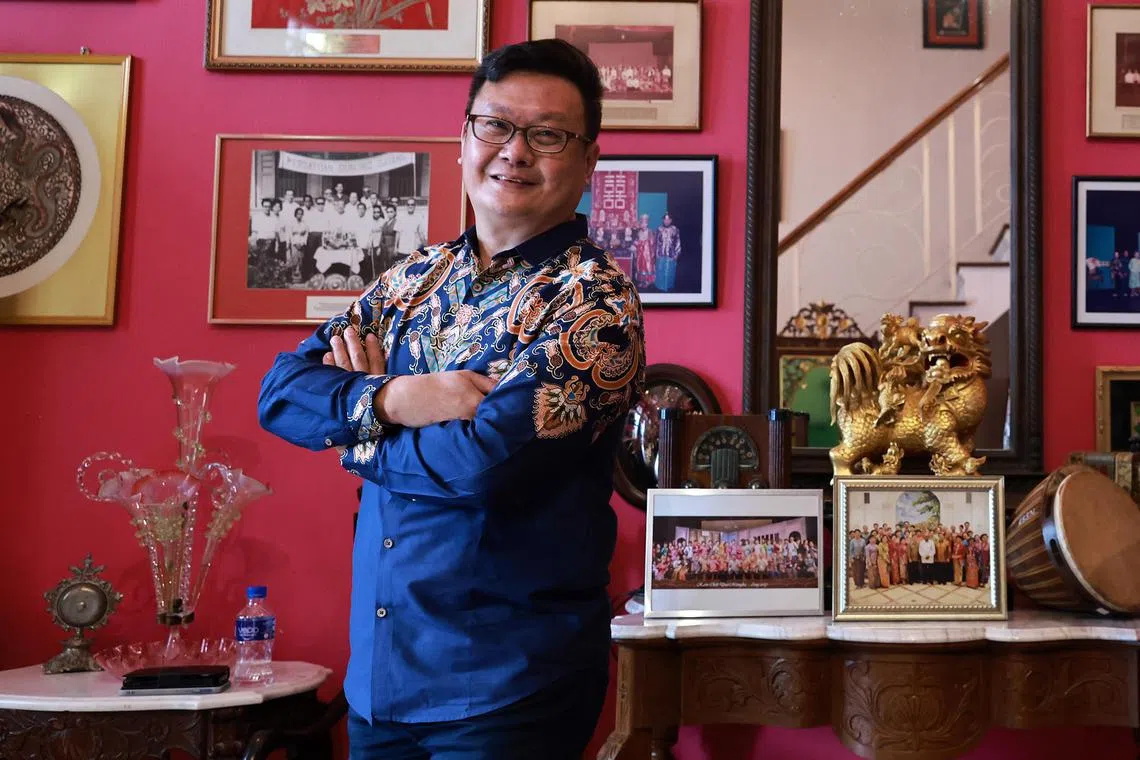
Gunong Sayang Association president Alvin Teo said he hopes the award will bring more attention to the arts group and Baba Malay - a creole with substantial Hokkien influence.
ST PHOTO: JASON QUAH
The Gunong Sayang Association was recognised for promoting Peranakan cultural activities through music, dance and Wayang Peranakan.
Wayang Peranakan is a theatre form that was derived from bangsawan, a type of Malay theatre, in the early 20th century. It is performed by the Chinese Peranakan mostly in the Baba Malay language – a Malay creole with substantial Hokkien influence.
Mr Alvin Teo, the association’s president, hopes the award will bring more attention to the performing arts group and Baba Malay. In 2014, the Endangered Languages Project estimated that there were only 2,000 native Baba Malay speakers left in the world.
The association has added English subtitles to its productions and staged plays addressing issues such as dementia, to appeal to modern audiences. It has also sought out younger actors to be part of its cast.
“We have been looking for successors to continue our art form, but most youngsters are career-oriented nowadays,” said Mr Teo.
“We have noticed a gradual increase in viewership of our shows, with people of different races showing interest in our performances.”
Mr Teo added: “The subtitles and glossaries we provide have helped bridge the gap between us and the audience, so I hope that more non-Baba Malay speakers will come to see our shows.”
National body for wushu, lion dance, dragon dance
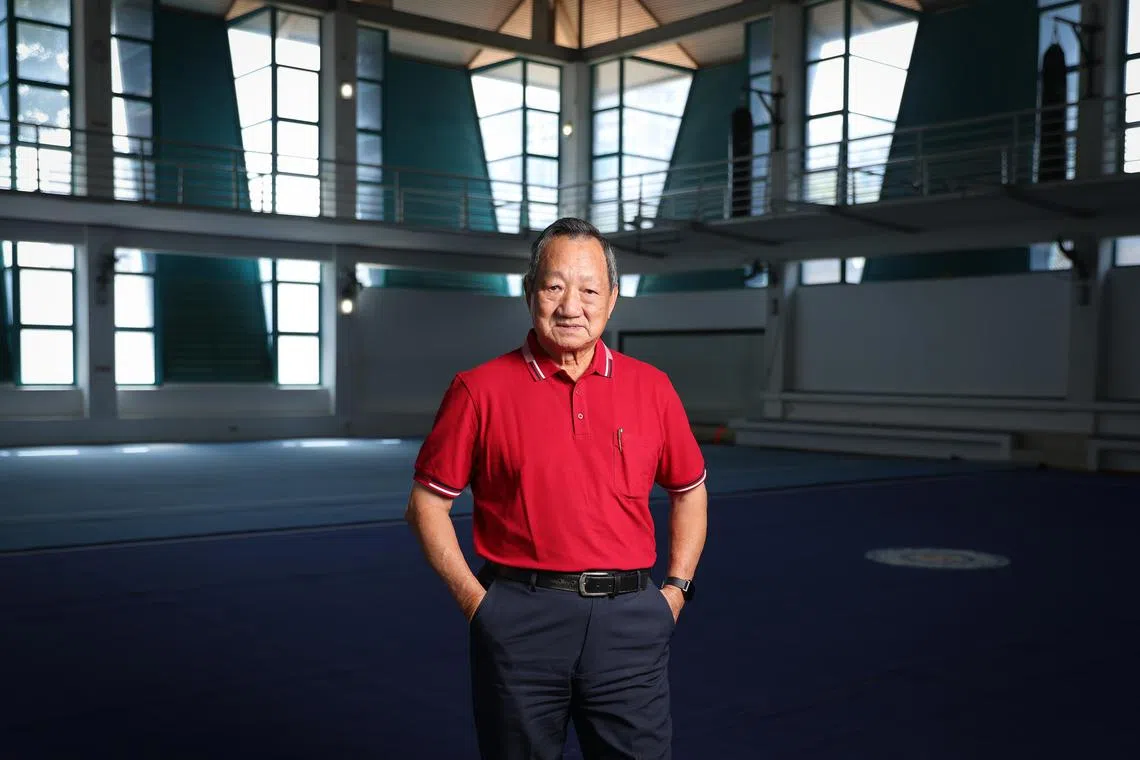
Singapore Wushu Dragon and Lion Dance Federation president Ang Mong Seng said he hopes the federation’s wushu performance team can attract more non-Chinese to try out the activities.
ST PHOTO: ONG WEE JIN
The Singapore Wushu Dragon and Lion Dance Federation has supported hundreds of member groups and organised sporting and community events, including the National Wushu Championships and the Ngee Ann City National Lion Dance Championship.
It is also responsible for managing the training and development of the national wushu team, which represents Singapore in the SEA Games.
Its president Ang Mong Seng, 73, said the award is a huge encouragement.
“I hope young people can give dragon and lion dance a try as well, as it promotes Chinese culture and customs,” added the former two-term MP for Hong Kah GRC.
He said the federation’s wushu performance team, which performs at festive events, has one Malay and one Indian member and hopes they can attract more non-Chinese people to try out their activities.
“Our aim now is to carry out more activities at community centres to connect with the people. We hope more Singaporeans can participate to stay fit and healthy.”

